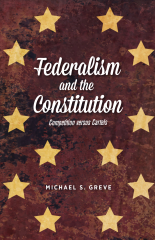- | Housing Housing
- | Data Visualizations Data Visualizations
- |
Two Models of Federalism Highlight Growing Divide Among States
Increasingly, states are deeply divided on central questions of national politics and policy. The divide is often viewed as a lamentable and perhaps dangerous form of political “polarization.” But those fears are exaggerated. In fact, the divide between and among the states offers an opportunity to reform federalism on a constitutional basis.
Our constitutional order forces states to compete for a mobile citizenry’s talents, assets, and affections. Exploitative state policies will induce citizens and business to move to a more hospitable state, whereas a sensible mix of policies, coupled with other state attractions, will attract citizens and their business. In this fashion, federalism disciplines state politicians. However, many of them will seek to evade that discipline. Just as firms in competitive markets often seek to restrict competition, states will attempt to form anti-competitive cartels, with the help and under the umbrella of the federal government. Federal minimum regulatory standards (for example, for wages and labor conditions) are one anticompetitive strategy. Federal fiscal transfers for programs that states would otherwise have to fund from own-source revenues (such as Medicaid) are another. Such “cooperative” cartel arrangements, of course, have become pervasive. Federal minimum standards cover a vast swath of productive activity, and federal transfer payments exceed $600 billion per year.
Only one set of conditions can arrest cartel federalism’s march and check the state demand for federal intervention: concerted opposition by a bloc of pro-competitive states that have nothing to gain, and everything to lose, from federally sponsored cartelization. Happily, those conditions increasingly characterize the state of our federalism.
The map shows the states’ positions—competition versus cartel—in three highly salient policy dimensions:
- Labor Regulation. Competitive states have right-to-work laws; cartel states do not. (Right-to-work laws are a very good proxy for states’ overall business regulation.)
- Affordable Care Act. The ACA’s expansion of Medicaid and its health care exchanges embody a comprehensive cartel regime, financed through federal transfer payments and subsidies. Competitive states opposed the ACA in NFIB v. Sebelius (2012); cartel states supported the act.
- Climate Change. “Green” policies entail high-cost production. States that are committed to such policies put themselves at a competitive disadvantage. Thus, their strategy is to raise their competitive (and, typically, energy-producing) rivals’ costs through federal climate change regulation. Competitive states opposed such regulation in Massachusetts v. EPA (2007), Utility Air Regulatory Group v. EPA (2014), or both; cartel states supported federal regulation.
States supporting the competitive position in two or three criteria are shown in light and dark aqua, respectively. States supporting the cartel position are shown in orange.
The competitive state bloc includes Alabama, Florida, Georgia, Idaho, Indiana, Kansas, Louisiana, Michigan, Nebraska, North Dakota, South Carolina, South Dakota, Texas, Utah, and Wyoming. Unsurprisingly, these are the fastest-growing, most dynamic states in the union. The cartel bloc includes California, Connecticut, Delaware, Illinois, Maryland, Massachusetts, New Mexico, New York, Oregon, and Vermont. These are consistently ranked among the least competitive among the 50 states.
The contest between the two blocs, between competition and cartel, will increasingly shape the contours of our national politics and our economic future. To the extent that the pro-competitive states recognize their common interest and manage to act as a cohesive bloc in Congress and in the regulatory process, it may yet be possible to reestablish a more competitive, constitutional federalism.
To read more about federalism’s current state and dynamics, see Michael S. Greve, “Federalism and the Constitution: Competition versus Cartels” (special study, Mercatus Center at George Mason University, Arlington, VA, 2015). The paperback and Kindle ebook are available from Amazon.com.


